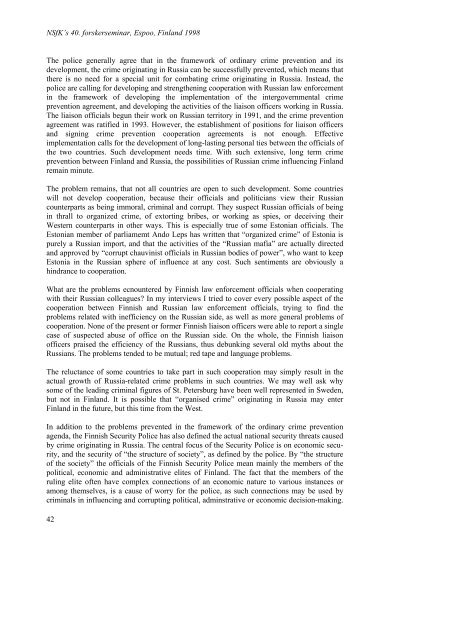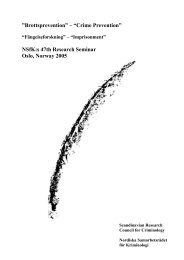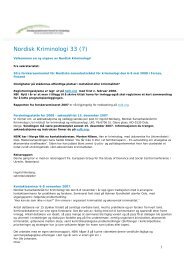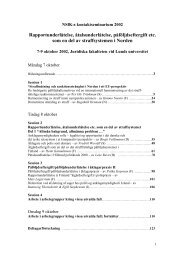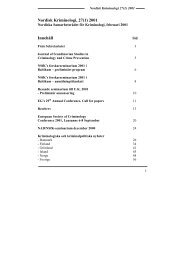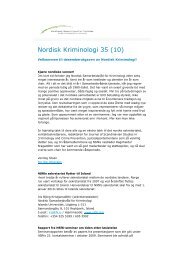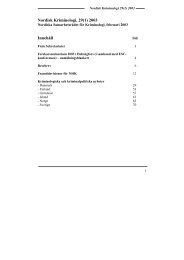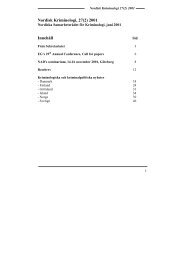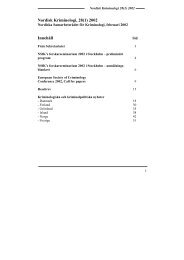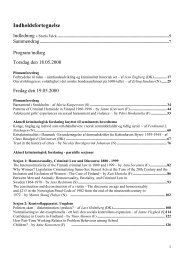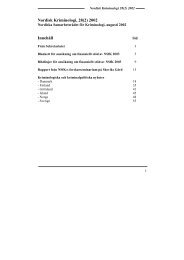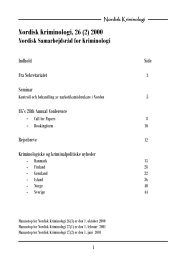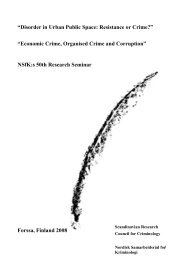Organised Crime & Crime Prevention - what works? - Scandinavian ...
Organised Crime & Crime Prevention - what works? - Scandinavian ...
Organised Crime & Crime Prevention - what works? - Scandinavian ...
You also want an ePaper? Increase the reach of your titles
YUMPU automatically turns print PDFs into web optimized ePapers that Google loves.
NSfK’s 40. forskerseminar, Espoo, Finland 1998<br />
The police generally agree that in the framework of ordinary crime prevention and its<br />
development, the crime originating in Russia can be successfully prevented, which means that<br />
there is no need for a special unit for combating crime originating in Russia. Instead, the<br />
police are calling for developing and strengthening cooperation with Russian law enforcement<br />
in the framework of developing the implementation of the intergovernmental crime<br />
prevention agreement, and developing the activities of the liaison officers working in Russia.<br />
The liaison officials begun their work on Russian territory in 1991, and the crime prevention<br />
agreement was ratified in 1993. However, the establishment of positions for liaison officers<br />
and signing crime prevention cooperation agreements is not enough. Effective<br />
implementation calls for the development of long-lasting personal ties between the officials of<br />
the two countries. Such development needs time. With such extensive, long term crime<br />
prevention between Finland and Russia, the possibilities of Russian crime influencing Finland<br />
remain minute.<br />
The problem remains, that not all countries are open to such development. Some countries<br />
will not develop cooperation, because their officials and politicians view their Russian<br />
counterparts as being immoral, criminal and corrupt. They suspect Russian officials of being<br />
in thrall to organized crime, of extorting bribes, or working as spies, or deceiving their<br />
Western counterparts in other ways. This is especially true of some Estonian officials. The<br />
Estonian member of parliamemt Ando Leps has written that “organized crime” of Estonia is<br />
purely a Russian import, and that the activities of the “Russian mafia” are actually directed<br />
and approved by “corrupt chauvinist officials in Russian bodies of power”, who want to keep<br />
Estonia in the Russian sphere of influence at any cost. Such sentiments are obviously a<br />
hindrance to cooperation.<br />
What are the problems ecnountered by Finnish law enforcement officials when cooperating<br />
with their Russian colleagues? In my interviews I tried to cover every possible aspect of the<br />
cooperation between Finnish and Russian law enforcement officials, trying to find the<br />
problems related with inefficiency on the Russian side, as well as more general problems of<br />
cooperation. None of the present or former Finnish liaison officers were able to report a single<br />
case of suspected abuse of office on the Russian side. On the whole, the Finnish liaison<br />
officers praised the efficiency of the Russians, thus debunking several old myths about the<br />
Russians. The problems tended to be mutual; red tape and language problems.<br />
The reluctance of some countries to take part in such cooperation may simply result in the<br />
actual growth of Russia-related crime problems in such countries. We may well ask why<br />
some of the leading criminal figures of St. Petersburg have been well represented in Sweden,<br />
but not in Finland. It is possible that “organised crime” originating in Russia may enter<br />
Finland in the future, but this time from the West.<br />
In addition to the problems prevented in the framework of the ordinary crime prevention<br />
agenda, the Finnish Security Police has also defined the actual national security threats caused<br />
by crime originating in Russia. The central focus of the Security Police is on economic security,<br />
and the security of “the structure of society”, as defined by the police. By “the structure<br />
of the society” the officials of the Finnish Security Police mean mainly the members of the<br />
political, economic and administrative elites of Finland. The fact that the members of the<br />
ruling elite often have complex connections of an economic nature to various instances or<br />
among themselves, is a cause of worry for the police, as such connections may be used by<br />
criminals in influencing and corrupting political, adminstrative or economic decision-making.<br />
42


